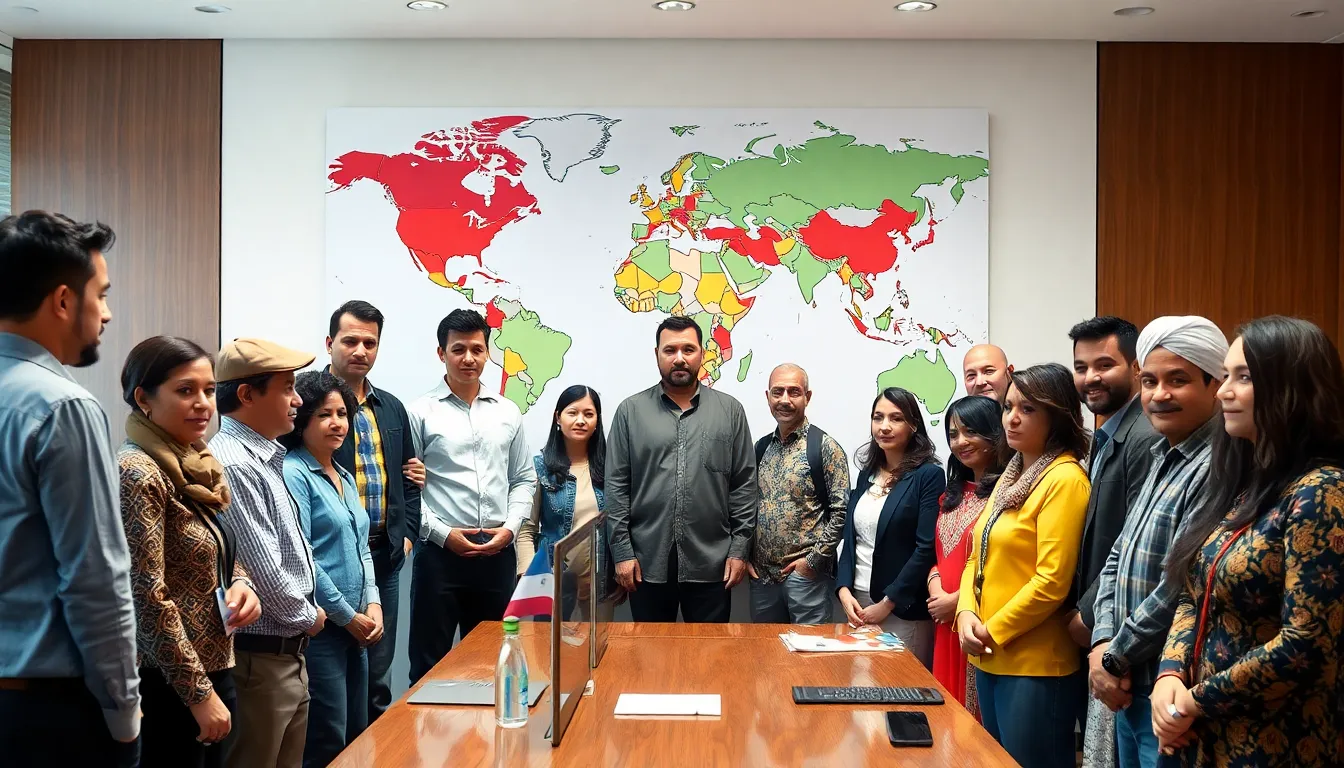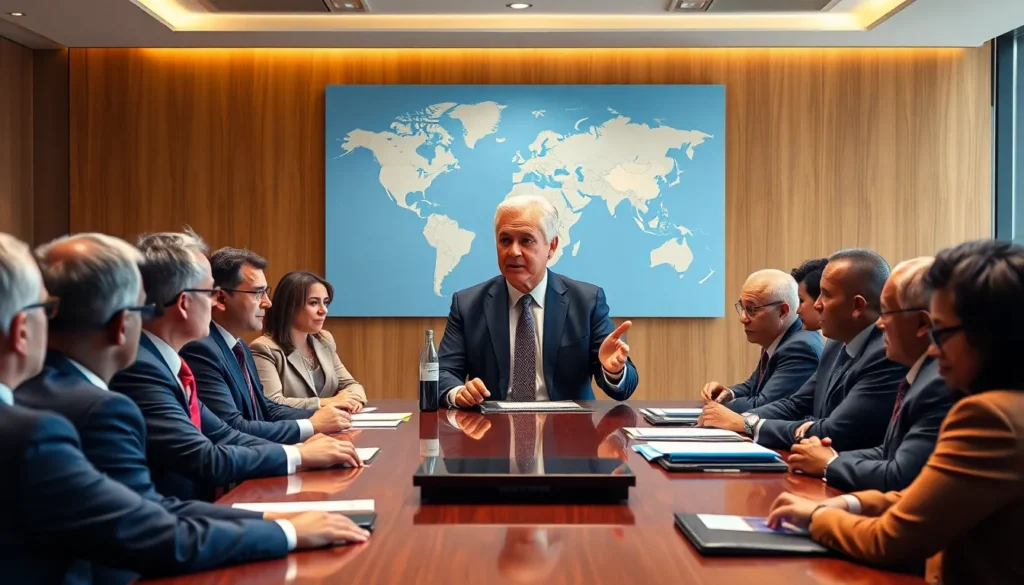Table of Contents
ToggleIn an increasingly interconnected world, global security has become a pressing concern for nations and communities alike. Threats such as terrorism, cyberattacks, and geopolitical tensions challenge traditional security frameworks and demand innovative solutions. As nations grapple with these complexities, understanding the dynamics of global security is crucial for fostering peace and stability.
The landscape of global security is constantly evolving, influenced by technological advancements and shifting political alliances. Countries must navigate this intricate web of challenges while collaborating to enhance their collective safety. By examining current trends and emerging threats, one can gain valuable insights into the future of global security and the strategies needed to address these issues effectively.
Overview of Global Security
Global security encompasses a broad range of issues crucial for maintaining safety and stability across nations. It requires a comprehensive understanding of threats and the collaborative efforts necessary to mitigate them.
Definition and Importance
Global security refers to the protection of states, organizations, and individuals from threats, such as terrorism, cybercrime, and military conflicts. Its importance lies in safeguarding national interests, preserving peace, and ensuring economic stability. Effective global security fosters international cooperation, promotes trust, and bolsters resilience against emerging risks.
Key Components
- International Cooperation: Countries must collaborate to address threats that transcend borders, sharing intelligence and resources.
- Cybersecurity Measures: As cyberattacks increase, robust cybersecurity protocols and technologies become essential for protecting critical infrastructure.
- Counterterrorism Strategies: Nations adopt comprehensive counterterrorism strategies, including intelligence sharing and community engagement, to neutralize terrorist threats.
- Conflict Resolution: Diplomatic efforts and peacekeeping missions play vital roles in resolving conflicts and maintaining stability in volatile regions.
- Economic Security: Ensuring economic stability helps mitigate vulnerabilities, preventing crises that could lead to social unrest or conflict.
- Intelligence Gathering: Effective intelligence operations provide crucial insights into potential threats, enabling timely responses and preventative measures.
Threats to Global Security

Global security faces diverse challenges that jeopardize stability and peace worldwide. These threats can be categorized into traditional and non-traditional threats.
Traditional Threats
Traditional threats primarily involve state-centric conflicts, military actions, and territorial disputes. Examples include:
- Military Conflicts: Armed confrontations between nations can escalate quickly. Recent military engagements in regions like the Middle East and Eastern Europe demonstrate the potential for widespread instability.
- Terrorism: Terrorist organizations pose risks to global security by executing attacks with devastating impacts. Groups like ISIS and Al-Qaeda continue to shape international counterterrorism strategies.
- Nuclear Proliferation: The acquisition of nuclear weapons by rogue states presents a significant risk. Efforts to limit nuclear arsenals through treaties, like the Treaty on the Non-Proliferation of Nuclear Weapons, remain critical to curbing this threat.
- Cyber Warfare: Traditional military strategies increasingly encompass cyber capabilities. Nations may conduct cyberattacks to disrupt critical infrastructure, as seen in incidents targeting government systems and private sector networks.
Non-Traditional Threats
- Cybercrime: Cybercriminals exploit digital vulnerabilities, affecting individuals and organizations. Cyberattacks can lead to data breaches, financial losses, and identity theft, necessitating stringent cybersecurity measures.
- Climate Change: The impacts of climate change, such as natural disasters and resource scarcity, generate conflicts over water, land, and food. Mitigating these effects requires international cooperation and sustainable policies.
- Pandemics: Health crises like COVID-19 disrupt global economies and social systems. Preparing for future pandemics involves enhancing public health infrastructures and fostering global collaboration.
- Misinformation: The rapid spread of misinformation undermines trust in institutions and fuels social unrest. Tackling this challenge requires robust media literacy initiatives and effective communication strategies.
Global Security Partnerships
Global security partnerships play a critical role in addressing the multifaceted challenges of an interconnected world. Collaboration among nations and entities strengthens collective efforts to promote security and stability.
International Organizations
International organizations serve as pivotal platforms for fostering collaboration among member states on security issues. Organizations like the United Nations (UN), North Atlantic Treaty Organization (NATO), and the African Union (AU) enhance collective security measures and facilitate diplomatic engagement.
- United Nations: The UN focuses on conflict resolution, peacekeeping missions, and human rights advocacy, addressing security at global and regional levels.
- NATO: This military alliance emphasizes collective defense, uniting members against threats while promoting stability in Europe and North America.
- African Union: The AU addresses security challenges specific to Africa, coordinating peacekeeping missions and conflict resolution initiatives across the continent.
Bilateral and Multilateral Agreements
Bilateral and multilateral agreements enhance cooperation between countries, creating frameworks for joint security initiatives. These agreements address diverse threats and promote defense collaboration.
- Bilateral agreements: These involve partnerships between two nations, facilitating intelligence sharing and joint military exercises. For example, the U.S.-Japan security treaty allows for mutual defense support in times of crisis.
- Multilateral agreements: These involve multiple countries, focusing on common security concerns. The Treaty on the Non-Proliferation of Nuclear Weapons (NPT) aims to prevent the spread of nuclear weapons and promote disarmament among signatory states. Another example includes the Paris Agreement, which encourages collaborative action to combat climate change and its security implications.
Global security partnerships through international organizations and agreements enhance collective efforts to confront and adapt to evolving security threats, fostering a safer and more stable world.
Strategies for Enhancing Global Security
Enhanced global security requires a multi-faceted approach that includes preventive measures and effective crisis management. These strategies aim to address the complex and evolving threats to international safety.
Preventive Measures
Preventive measures focus on addressing potential threats before they escalate. Intelligence sharing among nations is crucial for identifying risks and facilitating timely interventions. Implementing joint training exercises among military and law enforcement agencies strengthens readiness against potential security breaches.
Cybersecurity initiatives play a vital role, requiring continuous assessments of digital infrastructures to protect sensitive information from cyberattacks. Establishing cybersecurity frameworks that promote best practices enables organizations to mitigate vulnerabilities effectively.
Diplomatic engagement through foreign policy promotes stability and fosters dialogue among conflicting parties. Initiatives like conflict mediation and peacekeeping missions work to prevent disputes from developing into violent confrontations.
Addressing environmental changes is also essential in preventive efforts. Collaborating on climate change initiatives can reduce resource-based conflicts, ensuring a more stable global environment.
Crisis Management
Crisis management involves a rapid and coordinated response to security incidents. Establishing clear communication channels between nations enables swift information dissemination during emergencies. Countries must develop crisis response plans to streamline resource allocation and operational efficiency.
Leveraging advanced technologies, such as data analytics and real-time monitoring systems, allows for more accurate assessments of crisis situations. These technologies can enhance situational awareness and lead to informed decision-making.
International organizations, like the UN and NATO, play a significant role in coordinating responses to global crises. Their established frameworks facilitate collaboration and ensure a unified approach to addressing security threats.
Training and exercising emergency response systems across borders enhance preparedness. Engaging in regular drills equips nations with the skills and knowledge needed to respond effectively.
Integrating community resilience programs can also bolster crisis management efforts. Empowering local populations through education and resources provides vital support during emergencies, ensuring communities can adapt and recover from crises.
Future of Global Security
Global security’s future will be shaped by evolving trends and emerging challenges. Understanding these dynamics is essential for developing effective strategies to ensure stability and safety.
Emerging Trends
Technological advancements significantly impact global security. Cybersecurity innovations aim to counter increased cyber threats, enhancing protective measures for critical infrastructure. Artificial intelligence (AI) plays a pivotal role, improving threat detection and response abilities. Governments invest in AI capabilities for predictive analysis and rapid incident response.
Additionally, climate change awareness is growing. Security policies integrate environmental considerations, acknowledging resource scarcity and potential conflicts over dwindling supplies. Nations prioritize resilience planning, bolstering efforts to mitigate climate-induced risks.
The focus on hybrid warfare is also rising. State and non-state actors use a combination of conventional military tactics and cyber strategies to achieve their objectives. This approach complicates security responses, requiring tailored strategies to address multifaceted threats effectively.
Challenges Ahead
Global security faces several challenges that demand urgent attention. Geopolitical tensions continue to escalate, often driven by competition for resources and influence among major powers. Territorial disputes pose risks of military confrontations, particularly in regions like the South China Sea and Eastern Europe.
In addition, cyberattacks become more sophisticated, targeting critical infrastructure and government systems. Organizations face persistent threats from ransomware, data breaches, and espionage tactics employed by state-sponsored actors. Protecting digital assets and enhancing cybersecurity becomes crucial for maintaining stability.
Misinformation and disinformation campaigns undermine public trust in institutions. These campaigns create divisive narratives and manipulate social perceptions, complicating cooperation initiatives. Addressing the effects of false information requires robust countermeasures and public awareness efforts.
Lastly, pandemics highlight vulnerabilities in global health systems. The recent COVID-19 crisis demonstrated the interconnectedness of health and security. Enhanced global health security measures are necessary to prevent future outbreaks from exacerbating existing tensions.
Global security remains a complex and evolving challenge that demands attention from all nations. As threats become increasingly diverse and interconnected, the importance of collaboration and innovative strategies can’t be overstated. Nations must prioritize partnerships and share intelligence to effectively combat traditional and non-traditional security threats.
Investing in robust cybersecurity measures and fostering diplomatic relationships will be crucial in navigating the future landscape of global security. By addressing these challenges through a multi-faceted approach, the international community can work towards a safer and more stable world for everyone. The journey towards enhanced global security is ongoing and requires sustained commitment and cooperation from all stakeholders.







